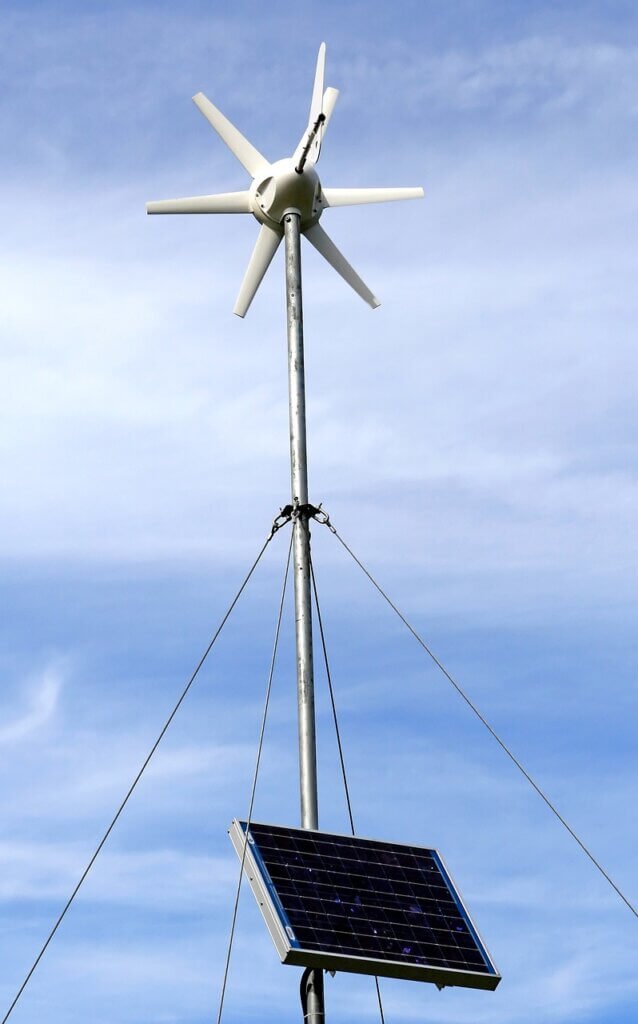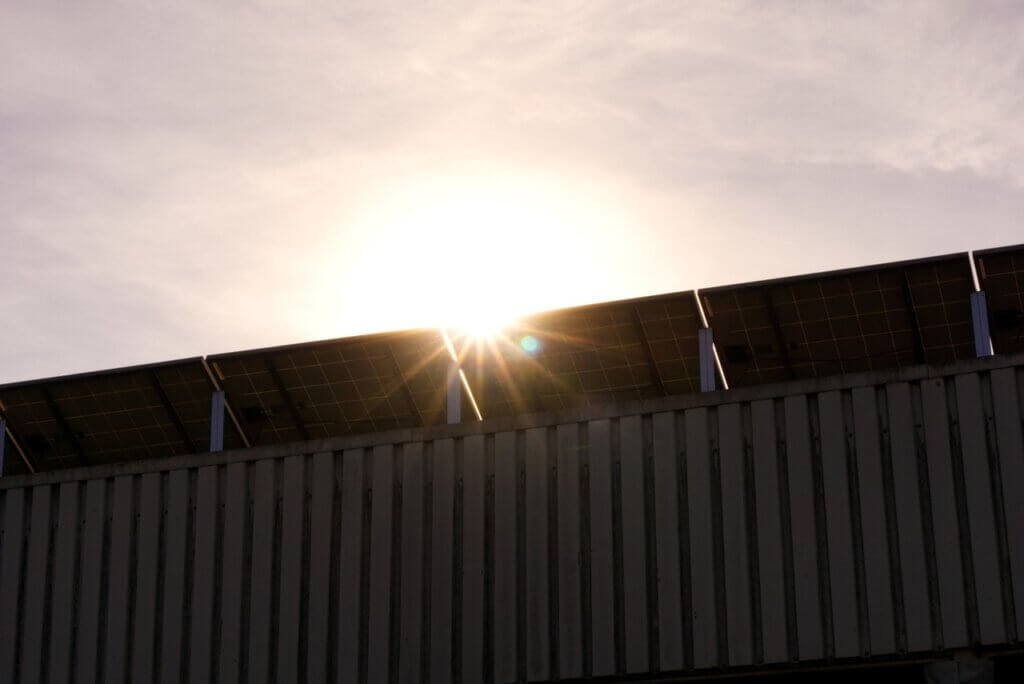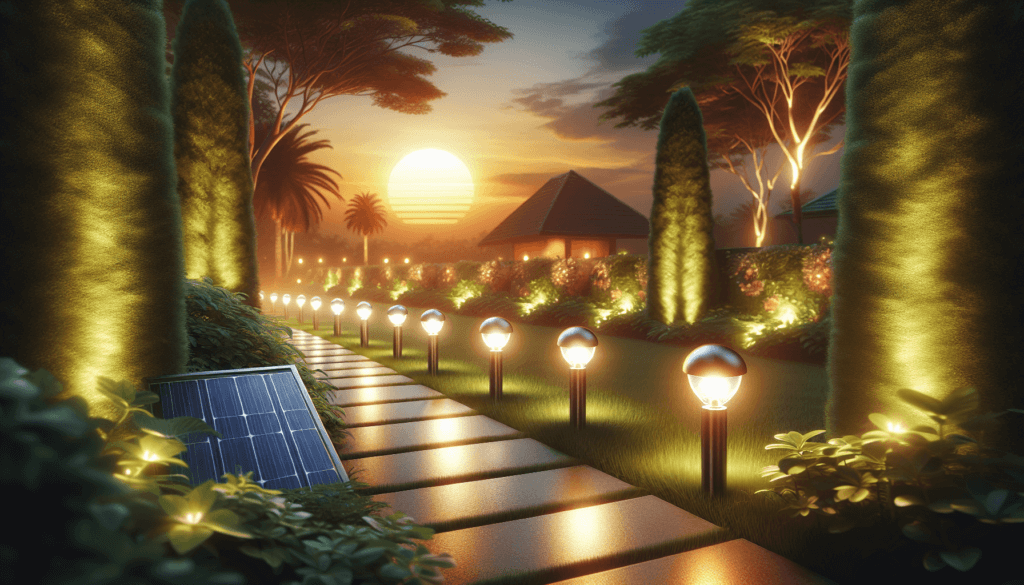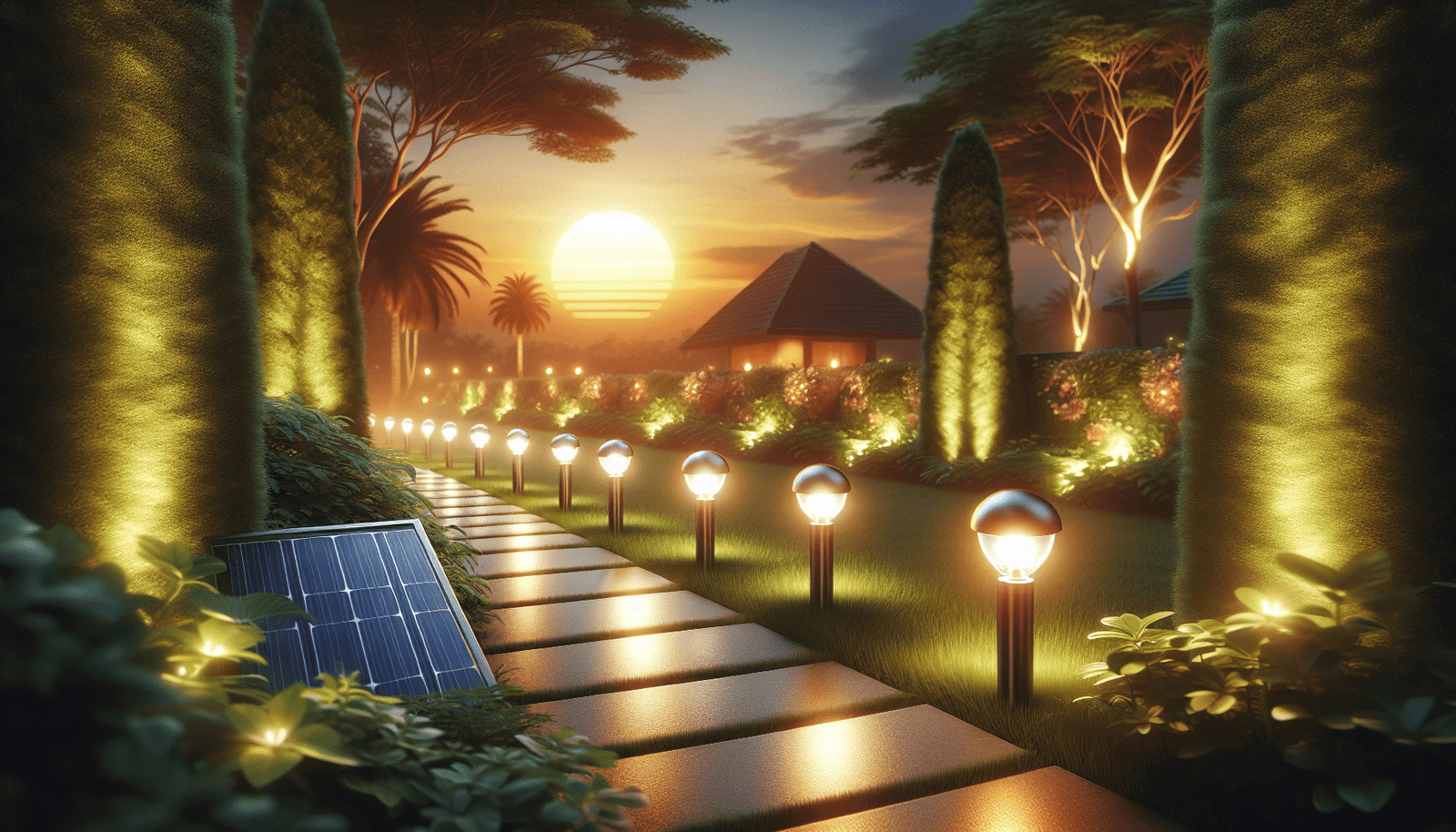Imagine a picturesque evening, with your beautiful garden softly illuminated by gentle, ambient lighting. Now, picture achieving this enchanting atmosphere while also saving on energy costs and reducing your carbon footprint. Enter solar power for garden lighting – a sustainable and eco-friendly alternative that harnesses the power of the sun to illuminate your outdoor space. In this article, we will explore the benefits and practicality of using solar power for garden lighting, empowering you to create an alluring and environmentally conscious outdoor haven.
Why Choose Solar Power for Garden Lighting
When it comes to illuminating your garden, choosing solar power for your lighting needs can provide numerous advantages. Not only is solar power cost-effective, but it is also environmentally friendly, making it a popular choice for both homeowners and garden enthusiasts. Additionally, solar garden lights are easy to install and maintain, making them a hassle-free option for adding beauty and functionality to your outdoor space.
Advantages of Solar Power
One of the primary advantages of using solar power for garden lighting is its cost-effectiveness. Solar garden lights rely on sunlight to generate electricity, eliminating the need for traditional electricity sources. This means that once you invest in solar garden lights, you will enjoy free lighting that does not cause an increase in your electricity bill. You can save money in the long run while still enjoying a beautifully lit garden.
Another significant advantage of solar power is its environmental friendliness. Solar garden lights harness energy from the sun, a renewable resource, and convert it into electricity. By using solar power for your garden lighting, you reduce your carbon footprint and contribute to a cleaner, greener planet. Solar power is a sustainable solution that aligns with the growing focus on eco-friendly practices.

Easy Installation and Maintenance
Installing solar garden lights is a breeze compared to traditional lighting options. There is no need to hire an electrician or go through the hassle of wiring the lights to your electricity source. Solar garden lights are wireless and can be easily installed wherever desired, without the need for extensive planning or wiring.
Maintenance of solar garden lights is also minimal. The only regular maintenance required is to ensure that the solar panels are clean and free from dust or debris. This can be done by simply wiping them with a soft cloth or brushing them gently. Additionally, it is advisable to check and replace the rechargeable batteries periodically to ensure optimal performance.
Components of Solar Garden Lighting
Solar garden lights consist of several key components that work together to provide illumination in your outdoor space. Understanding these components can help you make informed decisions when selecting the right solar garden lights for your needs.
Solar Panels
Solar panels are the crucial component of solar garden lights. They absorb sunlight and convert it into electricity, which powers the lights. The efficiency of the solar panel determines the amount of energy that can be harnessed, so it is important to choose high-quality solar panels for optimal performance.
Rechargeable Batteries
Rechargeable batteries store the energy captured by the solar panels during the day, allowing the lights to illuminate during the night. These batteries are typically low-maintenance and long-lasting, providing reliable power for your garden lights.
LED Lights
LED lights are the most common type of lighting used in solar garden lights. LED lights are energy-efficient and provide bright, focused illumination. They come in various colors and designs, allowing you to customize the ambiance of your garden.
Light Sensors
Light sensors are an essential component of solar garden lights, as they detect when it becomes dark and automatically turn on the lights. This feature ensures that your garden remains illuminated without the need for manual intervention.
Controller
The controller is responsible for managing the flow of energy between the solar panels, rechargeable batteries, and LED lights. It regulates the charging of the batteries and controls the lighting functions, ensuring optimal performance and longevity.

Types of Solar Garden Lights
Solar garden lights come in a variety of types, each serving a different purpose and aesthetic appeal. Understanding the various types can help you determine which ones are best suited for your specific needs.
Path Lights
Path lights are ideal for illuminating walkways, pathways, and garden paths. They provide a soft, ambient glow, enhancing the safety and aesthetics of your garden. Path lights are available in various designs and heights to suit your preferences.
Spotlights
Spotlights are perfect for highlighting specific features or focal points in your garden. Whether it’s a beautiful tree, a striking sculpture, or a colorful flower bed, spotlights draw attention and create visual interest. They are adjustable and can be easily positioned to achieve the desired lighting effect.
String Lights
String lights add a charming and whimsical touch to your garden. They can be draped across trees, fences, or pergolas, creating a warm and inviting atmosphere. String lights are available in various lengths and colors, allowing you to create a unique and enchanting ambiance.
Decorative Lights
Decorative lights serve both an aesthetic and functional purpose. They come in different shapes and designs, such as lanterns or globe lights, and can be placed on tables, hung from trees, or displayed on garden features. Decorative lights add a touch of elegance and creativity to your outdoor space.
Selecting the Right Solar Garden Lights
When choosing solar garden lights, several factors need to be considered to ensure they meet your specific requirements. Considerations such as location, brightness level, battery capacity, and design and style play a crucial role in selecting the right lights for your garden.
Consider the Location
The location of your garden lights will determine the type and number of lights needed. Evaluate the areas in your garden that require illumination and consider whether you need path lights, spotlights, or a combination of different types. This assessment will help you determine the appropriate locations for installing the lights.
Brightness Level
The brightness level of solar garden lights varies, and it is important to choose lights that provide the desired level of illumination for your garden. Brightness is measured in lumens, so check the product specifications to ensure the lights meet your lighting needs.
Battery Capacity
The battery capacity affects how long the lights can stay illuminated during the night. Consider the number of hours you want the lights to be operational and choose lights with batteries that can provide sufficient power to meet those requirements.
Design and Style
The design and style of solar garden lights can greatly enhance the overall aesthetics of your outdoor space. Consider the architectural style of your garden and choose lights that complement the existing design elements. Whether you prefer modern and sleek or traditional and rustic, there are plenty of options to suit your taste.

Installation and Placement of Solar Garden Lights
Proper installation and placement of solar garden lights are crucial for optimal performance and functionality. Consider the following guidelines when installing your lights to ensure they function efficiently and provide the desired lighting effect.
Choosing the Right Location
Select locations for your solar garden lights that receive ample sunlight during the day. Avoid shaded areas or locations that are frequently obstructed by trees or buildings. Placing the lights in direct sunlight will ensure that the solar panels can absorb maximum sunlight, leading to efficient charging and longer illumination hours.
Positioning the Solar Panel
Position the solar panel of each light in a way that it receives direct sunlight. Adjust the angle and orientation of the solar panel to maximize its exposure to sunlight. This will optimize the performance and charging capability of the solar panel, resulting in brighter and longer-lasting illumination.
Spacing and Arranging the Lights
Proper spacing and arrangement of solar garden lights create a visually appealing lighting scheme. Consider the type of lights you have and their intended purpose. Path lights, for example, should be evenly spaced along walkways, while spotlights may require closer proximity to the features they are highlighting. Experiment with different arrangements to achieve the desired lighting effect.
Maintenance Tips for Solar Garden Lights
To keep your solar garden lights in optimal condition and ensure they function effectively over time, regular maintenance is essential. Follow these simple maintenance tips to prolong the lifespan of your lights and maximize their performance.
Cleaning the Solar Panels
Over time, dust, dirt, and debris can accumulate on the surface of the solar panels, reducing their efficiency. Regularly clean the panels using a soft cloth or a brush to remove any build-up. This will ensure that the panels can absorb maximum sunlight and generate optimal electricity for the lights.
Checking and Replacing Batteries
Periodically check the condition of the rechargeable batteries in your solar garden lights. If the lights are not illuminating as brightly or for as long as they used to, it may be an indication that the batteries need replacement. Follow the manufacturer’s instructions to safely replace the batteries and restore the lights’ performance.
Testing the Lights
Regularly test the lights to ensure they are working properly. This can be done simply by covering the solar panels to simulate darkness and checking if the lights automatically turn on. If any lights fail to illuminate or show signs of malfunction, troubleshoot the issue or seek professional assistance if needed.

Enhancing Solar Garden Lighting Performance
To further enhance the performance and effectiveness of your solar garden lights, consider implementing the following strategies:
Using Solar Panel Reflectors
Solar panel reflectors maximize the sunlight captured by the solar panels, further increasing their efficiency. These reflective surfaces can be positioned around the solar panels to redirect and concentrate sunlight onto the panels. This can be particularly beneficial in areas with limited sunlight or during the winter months when sunlight is reduced.
Managing Light Duration
Some solar garden lights come with the option to adjust the duration of lighting. Consider setting the lights to a shorter duration during the winter when nights are longer, and there is less sunlight available for charging. By managing the light duration, you can ensure that the lights remain operational throughout the night without draining the batteries excessively.
Optimizing Solar Panel Orientation
As the sun’s position changes throughout the year, adjusting the orientation of the solar panels can optimize their exposure to sunlight. Keep track of the sun’s trajectory and adjust the angle and position of the solar panels accordingly. This will help maximize the solar panels’ ability to capture sunlight and generate electricity.
Troubleshooting Common Solar Garden Lighting Issues
While solar garden lights are generally low-maintenance, occasional issues may arise. Here are some troubleshooting tips to address common problems:
Dim or Flickering Lights
If your solar garden lights appear dim or flickering, it may indicate a battery issue. Check the battery connections and ensure they are securely in place. If the batteries are old or damaged, replacing them with new ones should resolve the problem. Additionally, make sure the solar panels are clean and free from obstructions that may be hindering their ability to charge the batteries fully.
Inadequate Battery Life
If the battery life of your solar garden lights is insufficient, it may be due to insufficient sunlight exposure or a faulty solar panel. Check if the lights are positioned in an area that receives enough sunlight during the day. If not, consider relocating the lights to a more suitable spot. If the solar panel is damaged or defective, it may need to be repaired or replaced.
Moisture Damage
Exposure to excessive moisture or water can damage the components of solar garden lights. Make sure the lights are adequately sealed to prevent water damage. If you notice any signs of moisture or water ingress, disassemble the lights and dry them thoroughly before reassembling. Additionally, consider applying a waterproof sealant or covering for added protection.
Incorrect Light Activation
If your solar garden lights are not turning on at night or are not turning off during the day, it may indicate an issue with the light sensor. Ensure that the light sensor is not obstructed and is exposed to adequate darkness at night. If the problem persists, the light sensor may need to be replaced.

Solar Garden Lighting Beyond Decorative Purposes
Solar garden lighting serves more than just decorative purposes. Here are a few additional benefits of incorporating solar garden lights into your outdoor space:
Increased Safety and Security
Well-lit garden paths and walkways provide a safer environment, reducing the risk of accidents and falls. By illuminating potential hazards in your garden, solar path lights contribute to a safer outdoor space for you and your guests. Additionally, the presence of solar garden lights can deter potential intruders and enhance the security of your property.
Highlighting Garden Features
Whether you have an exquisite flower bed, a charming pond, or an impressive landscaping arrangement, solar spotlights can highlight and showcase your garden’s best features. By directing a focused beam of light onto these features, you create a captivating focal point and draw attention to the unique elements of your outdoor space.
Extending Outdoor Activities
Solar garden lights extend the usability of your outdoor space well into the evening. Whether you are hosting a garden party, enjoying a quiet evening outdoors, or simply appreciating the beauty of your garden, solar lights provide the illumination you need to enjoy these activities. With solar garden lights, your outdoor space becomes an inviting and functional area even after the sun sets.
Conclusion
Incorporating solar power for your garden lighting needs provides numerous advantages in terms of cost-effectiveness, environmental friendliness, and ease of installation and maintenance. By harnessing the power of the sun, solar garden lights offer a sustainable and efficient lighting solution that adds beauty and functionality to your outdoor space.
Understanding the components of solar garden lights, such as solar panels, rechargeable batteries, LED lights, light sensors, and controllers, allows you to make informed decisions when selecting the right lights for your garden. Consider the different types of solar garden lights, including path lights, spotlights, string lights, and decorative lights, to find the ones that best suit your preferences and needs.
To ensure the optimal performance of your solar garden lights, carefully consider the location, brightness level, battery capacity, and design and style. Proper installation and placement, along with regular maintenance, will help prolong the lifespan and efficiency of your lights. By following maintenance tips and implementing strategies to enhance performance, you can enjoy well-lit outdoor spaces throughout the year.
Should any issues arise, troubleshooting common problems, such as dim or flickering lights, inadequate battery life, moisture damage, or incorrect light activation, will help you address them effectively.
Beyond their decorative purposes, solar garden lights offer increased safety and security by illuminating paths and walkways. They also highlight your garden features and extend outdoor activities well into the evening.
In conclusion, solar power for garden lighting is a smart choice that brings numerous benefits to your outdoor space. By embracing solar technology, you can create a beautifully lit garden while contributing to a greener and more sustainable future.


